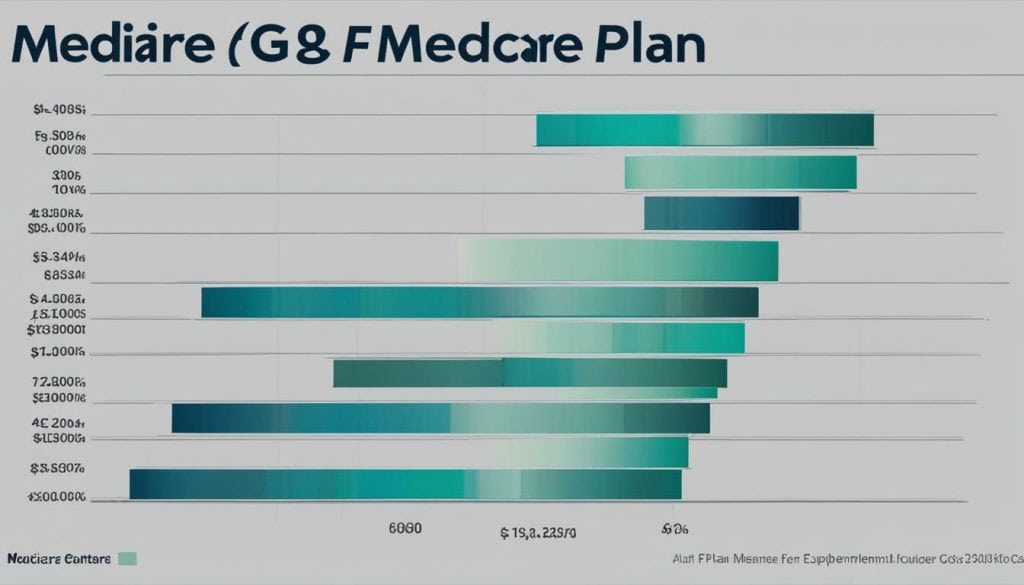When it comes to Medicare Supplement Plans, choosing the right one for your healthcare needs can be overwhelming. Two popular options are Plan F and Plan G, but what’s the difference? In this section, we’ll dive into the details to help you make an informed decision.
Medicare Supplement Plans, also known as Medigap plans, are offered by private insurance companies to fill the gaps in coverage left by Original Medicare (Parts A and B). These plans help cover out-of-pocket costs such as deductibles, copayments, and coinsurance. But what sets Plan F and Plan G apart?
- Medicare Supplement Plans fill the gaps in coverage left by Original Medicare.
- Plan F and Plan G are both popular options.
- Plan F offers comprehensive coverage without deductibles.
- Plan G provides a cost-effective alternative with slightly lower premiums.
- Choosing between plans depends on your healthcare needs and budget.
What Are Medicare Supplement Plans?
If you are new to Medicare, you may be wondering what Medicare Supplement Plans are and how they work. Medicare Supplement Plans, also known as Medigap plans, are offered by private insurance companies to help fill the gaps in coverage left by Original Medicare (Parts A and B). These plans help cover out-of-pocket costs such as deductibles, copayments, and coinsurance.
Medicare Supplement Plans are meant to provide additional coverage to Original Medicare, but they are not meant to replace Medicare. In fact, you must be enrolled in Medicare Parts A and B to be eligible for a Medicare Supplement Plan.
There are ten standardized types of Medicare Supplement Plans, labeled A through N, each with its own set of benefits. Each plan has different levels of coverage, and the cost of each plan may vary depending on your location and the insurance company offering the plan.
It’s important to note that Medicare Supplement Plans do not include prescription drug coverage. For prescription drug coverage, you will need to enroll in a Medicare Part D plan.

The primary benefit of Medicare Supplement Plans is that they help cover out-of-pocket costs that Original Medicare does not cover. This can provide you with greater financial protection against unexpected medical expenses.
Medicare Supplement Plans also offer flexibility in choosing healthcare providers. Unlike some Medicare Advantage plans, Medicare Supplement Plans do not have provider networks, meaning you can see any doctor or specialist who accepts Medicare.
Medicare Supplement Plans also provide guaranteed renewability, meaning as long as you pay your premium on time, your coverage cannot be canceled due to your health status. This can provide peace of mind in knowing that your healthcare coverage will always be available when you need it.
An Overview of Medicare Supplement Plan F
Medicare Supplement Plan F is one of the most comprehensive Medigap plans available. It covers all of the gaps left by Original Medicare, including Part A and Part B deductibles, copayments, and coinsurance. With Plan F, you can enjoy full coverage for Medicare-approved expenses without worrying about out-of-pocket costs.
Plan F has been a popular choice for those who want the peace of mind that comes with comprehensive coverage. However, it’s important to note that Plan F is no longer available to individuals who become eligible for Medicare after January 1, 2020. If you were enrolled in Plan F before this date, you can still keep your coverage.
| Plan F Coverage | Medicare-Covered Costs |
|---|---|
| Hospital costs after Medicare Part A deductible | 100% |
| Medical costs after Medicare Part B deductible | 100% |
| Inpatient mental health | 100% |
| Skilled nursing facility (SNF) care coinsurance | 100% |
| Foreign travel emergency | Up to plan limits |
While Plan F is known for its comprehensive coverage, it often comes with a higher monthly premium compared to other Medigap plans. It’s essential to compare the costs of Plan F and other plans, such as Plan G, to determine which offers the best value for your individual healthcare needs.

An Overview of Medicare Supplement Plan G
Medicare Supplement Plan G is an excellent alternative to Plan F for those who are willing to pay the Part B deductible themselves. Plan G covers the gaps in Original Medicare, including Part A and Part B coinsurance, copayments, and hospice care, just like Plan F. However, it does not cover the Part B deductible, which you would have to pay out-of-pocket. Once you meet the Part B deductible, Plan G provides the same comprehensive coverage as Plan F.
Many people see Plan G as a cost-effective option since it usually has a lower monthly premium compared to Plan F. In some cases, the savings from choosing Plan G over Plan F can be significant.
In addition to the benefits covered by Medicare Supplement Plan F, Plan G also covers excess charges. These are charges that doctors and healthcare providers may charge above the Medicare-approved amount for a particular service, which can sometimes be a significant expense.
It’s important to note that Plan G is not available everywhere, and its availability may depend on your location and the insurance company you choose. Some insurance companies may also offer different levels of coverage under Plan G, so it’s essential to review the coverage details carefully.

Overall, Medicare Supplement Plan G is a great choice for those who are willing to pay the Part B deductible out-of-pocket and are looking for a cost-effective alternative to Plan F. However, as with any healthcare decision, it’s crucial to consider your individual healthcare needs and budget when selecting a plan. Consulting with a licensed insurance agent who specializes in Medicare can also help provide clarity and guidance in making the right choice for your Medicare supplemental insurance coverage.
Comparing the Benefits of Plan F and Plan G
When choosing between Medicare Supplement Plan F and Plan G, it’s important to understand the benefits of each plan to make an informed decision. Both plans offer comprehensive coverage, but there are some differences to consider.
With Medicare Supplement Plan F, you can enjoy full coverage without having to worry about deductibles. Plan F covers all of the gaps left by Original Medicare, including Part A and Part B deductibles, copayments, and coinsurance. This makes Plan F an attractive option for those who want complete coverage.
On the other hand, Medicare Supplement Plan G is a cost-effective alternative that provides almost the same level of coverage as Plan F. While Plan G does not cover the Part B deductible, once you meet the deductible, Plan G provides comprehensive coverage for Medicare-approved expenses. Additionally, Plan G often has a lower monthly premium compared to Plan F, which can result in significant savings over time.
It’s important to note that there are no annual benefit changes for either Plan F or Plan G. This means that the coverage offered by these plans will remain the same from year to year, providing peace of mind and stability for your healthcare needs.
| Medicare Plan F Benefits | Medicare Plan G Benefits |
|---|---|
| Full coverage for all Original Medicare gaps, including Part A and Part B deductibles, copayments, and coinsurance | Covers all Original Medicare gaps except for the Part B deductible |
| Zero out-of-pocket costs for Medicare-approved expenses | Once you meet the Part B deductible, you will have zero out-of-pocket costs for Medicare-approved expenses |
| Predictable and stable coverage | Stable coverage with no annual benefit changes |
| Monthly premium may be higher compared to Plan G | Lower monthly premium compared to Plan F |

When it comes to choosing between Plan F and Plan G, it ultimately depends on your individual healthcare needs and budget. If you want complete coverage without deductibles, Plan F may be the right choice for you. However, if you’re looking for a cost-effective alternative and are willing to pay the Part B deductible yourself, Plan G could be a suitable option.
Before making a decision, consider the benefits and costs of each plan carefully. It may also be helpful to discuss your options with a licensed insurance agent who specializes in Medicare Supplemental Insurance. This can help you navigate the options and find the plan that best suits your needs.
Understanding the Costs of Plan F and Plan G
When it comes to the costs of Medicare Supplement Plan F and Plan G, it’s essential to consider various factors. One significant difference is their monthly premiums. In general, Plan F has a higher monthly premium due to its comprehensive coverage. On the other hand, Plan G usually has a lower monthly premium because it does not cover the Part B deductible.
However, it’s important to note that the costs can vary depending on the insurance company and your location. Therefore, it’s recommended to compare quotes from different providers to find the best pricing for your specific needs. Additionally, keep in mind that your healthcare needs may differ from others, affecting the overall cost of coverage.
| Plan F | Plan G |
|---|---|
| Higher monthly premium | Lower monthly premium |
| Covers Part B deductible | Does not cover Part B deductible |
| Comprehensive coverage with no deductibles | Comprehensive coverage with Part B deductible out-of-pocket |
Ultimately, the decision between Plan F and Plan G depends on your individual needs and budget. While Plan F provides full coverage without deductibles, it may not be the most cost-effective option. Plan G, on the other hand, offers a lower premium but requires you to pay the Part B deductible out-of-pocket.
Undoubtedly, the costs of Medicare Supplement Plans can add up over time. Therefore, it’s crucial to review the benefits and costs of each plan carefully before making a decision.

When it comes to choosing between Medicare Supplement Plan F and Plan G, it’s essential to weigh the benefits and costs of each plan carefully. Both plans offer comprehensive coverage that can fill the gaps left by Original Medicare, but the coverage for the Part B deductible is the main difference between them.
Plan F provides full coverage for deductibles, copayments, and coinsurance for Medicare-approved expenses, with no out-of-pocket costs. However, this plan is no longer available to new beneficiaries who became eligible for Medicare after January 1, 2020.
On the other hand, while Plan G does not cover the Part B deductible, once you meet the deductible, it provides the same comprehensive coverage as Plan F. Additionally, Plan G often has a lower monthly premium, which can lead to overall cost savings.
To make the right choice between Medicare Supplement Plan F and Plan G, it’s essential to evaluate your healthcare needs and budget. Consider the availability of the plans in your area and any potential future changes to the plans. Consulting with a licensed insurance agent who specializes in Medicare can also help provide clarity and assist you in making the best decision for your healthcare coverage.
Comparing Medicare Supplement Plan F and Plan G can help you determine which plan is the right fit for you. Reviewing the benefits and costs of each plan will help you make an informed decision that suits your healthcare needs. Don’t forget to compare quotes from different providers to find the best pricing for your specific situation.
Factors to Consider When Deciding Between Plan F and Plan G
When evaluating Medicare Supplement Plan F and Plan G, take into account your healthcare needs, budget, and the availability of the plans in your area. Additionally, consider any potential future changes to the plans, as coverage options may evolve over time.
Consulting with a licensed insurance agent who specializes in Medicare can help provide clarity and assist you in making the best decision for your healthcare coverage. An agent can help you compare the benefits and costs of each plan to determine which one is the best match for your needs.
Making an informed choice between Medicare Supplement Plan F and Plan G is crucial in getting the right coverage for your healthcare needs. Evaluating the benefits, costs, and factors that affect your coverage options can help you make the right decision.

Choosing between Medicare Supplement Plan F and Plan G can be challenging. To make an informed decision, consider your healthcare needs, budget, and the availability of the plans in your area.
Plan F provides comprehensive coverage, including coverage for the Part A and Part B deductibles, copayments, and coinsurance. With Plan F, you won’t have to worry about any out-of-pocket costs for Medicare-approved services. However, keep in mind that Plan F is no longer available to individuals who become eligible for Medicare after January 1, 2020.
Plan G is a cost-effective alternative to Plan F. It covers the gaps left by Original Medicare, except for the Part B deductible. Once you meet the deductible, Plan G provides the same comprehensive coverage as Plan F. Plan G often has a lower monthly premium compared to Plan F, making it a suitable option for those who are willing to pay the Part B deductible themselves.
When evaluating your options, review the benefits and costs of each plan carefully. If you prefer comprehensive coverage without deductibles, Plan F might be the right choice for you. On the other hand, if you’re looking for a cost-effective option, Plan G could be a suitable alternative.
It’s also essential to take into account any potential future changes to the plans, as coverage options may evolve over time. Consulting with a licensed insurance agent who specializes in Medicare can also help provide clarity and assist you in making the best decision for your healthcare coverage.
| Medicare Plan F Coverage | Medicare Plan G Benefits |
|---|---|
| Covers Part A and Part B deductibles | Covers all gaps left by Original Medicare, except for the Part B deductible |
| Covers Part A and Part B copayments and coinsurance | Full coverage once you meet the Part B deductible |
| Covers Medicare-approved expenses without out-of-pocket costs | A cost-effective alternative with lower monthly premiums |
Ultimately, choosing between Plan F and Plan G depends on your individual healthcare needs and budget. Take the time to review your options carefully, and don’t hesitate to reach out to an insurance agent for guidance.

When it comes to enrolling in Medicare Supplement Plans, timing is key. The best time to enroll is during your Initial Enrollment Period, which lasts for seven months and begins three months before you turn 65. This period includes your birthday month and the three months that follow. During this time, insurance companies cannot deny your application or charge higher premiums based on pre-existing conditions.
If you miss your Initial Enrollment Period, you may still be eligible to enroll. However, insurance companies may take your health history into consideration when reviewing your application, and you may be subject to medical underwriting. This means that your premiums may be higher, or you may be denied coverage altogether.
It’s important to note that Medicare Supplement Plans are different from Medicare Advantage Plans, which have their own enrollment periods. If you’re not sure which type of plan is right for you, it’s best to speak with a licensed insurance agent who can help you navigate your options.
Frequently Asked Questions
| Question | Answer |
|---|---|
| Can I enroll in a Medicare Supplement Plan at any time? | No, the best time to enroll is during your Initial Enrollment Period. However, you may still be eligible for coverage outside of this period. |
| What happens if I miss my Initial Enrollment Period? | You may still be eligible to enroll, but insurance companies may take your health history into consideration and you may be subject to medical underwriting. |
| What is the difference between Medicare Supplement Plans and Medicare Advantage Plans? | Medicare Supplement Plans fill the gaps in coverage left by Original Medicare, while Medicare Advantage Plans are a type of Medicare health plan offered by private insurance companies that combine Part A, Part B, and sometimes Part D coverage into one plan. |

Enrolling in a Medicare Supplement Plan is an important decision that can impact your healthcare coverage and costs. Be sure to enroll during your Initial Enrollment Period to take advantage of the guaranteed issue right and avoid higher premiums. If you’re unsure which plan is right for you, consult with a licensed insurance agent who can guide you through the process and help you make an informed decision.
How to Apply for Medicare Supplement Plan F or Plan G
Applying for Medicare Supplement Plan F or Plan G is a straightforward process that can be done in a few simple steps. You can contact insurance companies directly to inquire about their plans or work with a licensed insurance agent who can help guide you through the application process.
When applying for Medicare Supplement Plan F or Plan G, it’s essential to have your Medicare card and any other necessary documentation readily available. This can include proof of age, residency, and eligibility for Medicare. You may also need to provide information about your medical history, particularly if you are applying outside of your Initial Enrollment Period.
Once you’ve gathered all of the necessary documentation, you can begin the application process. You will need to choose the insurance company you wish to work with and select the plan you are interested in. Your insurance agent can help you navigate the options and select the plan that best suits your needs and budget.
| Step | Action |
|---|---|
| 1 | Contact insurance companies directly or work with a licensed insurance agent to inquire about Medicare Supplement Plan F or Plan G. |
| 2 | Gather all necessary documentation, including your Medicare card and proof of age, residency, and eligibility for Medicare. |
| 3 | Select the insurance company you wish to work with and choose the plan you are interested in. |
After you’ve completed the application process, your insurance company will review your application and determine whether you meet the eligibility requirements for Medicare Supplement Plan F or Plan G. Once you are approved, you will receive your policy documents and can begin using your new coverage to help pay for out-of-pocket healthcare costs.

Applying for Medicare Supplement Plan F or Plan G is simple and can provide peace of mind knowing that you have comprehensive coverage for your healthcare needs. Be sure to review the benefits and costs of each plan carefully, as well as the enrollment periods for Medicare Supplement Plans, to make the right choice for your healthcare coverage.
Making the Right Choice for Your Healthcare Needs
When it comes to choosing between Medicare Supplement Plan F and Plan G, it’s essential to consider your healthcare needs, budget, and individual circumstances. Keep in mind that while Plan F offers comprehensive coverage without deductibles, Plan G provides a cost-effective alternative with slightly lower premiums.
Consulting with a licensed insurance agent who specializes in Medicare Supplemental Insurance Plan F and G can help you navigate the options and find the plan that best suits your needs. They can also provide clarity on any potential future changes to the plans, as coverage options may evolve over time.
Ultimately, the right choice for your healthcare needs will depend on your individual circumstances. Take the time to review the benefits and costs of each plan carefully before making a decision. Remember, applying for Medicare Supplement Plan F or Plan G is a simple process. You can contact insurance companies directly or work with a licensed insurance agent who can guide you through the application process.
By taking these steps, you can make a well-informed choice and ensure that you have the coverage you need to stay healthy and take care of your healthcare costs.
FAQ
Q: What is the difference between Medicare Supplement Plan F and Plan G?
A: Medicare Supplement Plan F provides comprehensive coverage, including the Part B deductible, while Plan G does not cover the Part B deductible. However, once the deductible is met, both plans offer the same comprehensive coverage.
Q: What are Medicare Supplement Plans?
A: Medicare Supplement Plans, also known as Medigap plans, are offered by private insurance companies to fill the gaps in coverage left by Original Medicare (Parts A and B). These plans help cover out-of-pocket costs such as deductibles, copayments, and coinsurance.
Q: What is an overview of Medicare Supplement Plan F?
A: Medicare Supplement Plan F is a comprehensive plan that covers all gaps left by Original Medicare, including deductibles, copayments, and coinsurance. However, it is no longer available to individuals who become eligible for Medicare after January 1, 2020.
Q: What is an overview of Medicare Supplement Plan G?
A: Medicare Supplement Plan G covers the gaps in Original Medicare, excluding the Part B deductible. However, once the deductible is met, Plan G provides the same comprehensive coverage as Plan F.
Q: How do the benefits of Plan F and Plan G compare?
A: Both Plan F and Plan G offer comprehensive coverage. The only difference is that Plan F covers the Part B deductible, while Plan G requires you to pay it out-of-pocket. However, Plan G often has a lower monthly premium.
Q: How do the costs of Plan F and Plan G compare?
A: Plan F generally has a higher monthly premium due to its comprehensive coverage, while Plan G offers a lower premium because it does not cover the Part B deductible. However, costs can vary depending on the insurance company and location.
Q: What factors should I consider when deciding between Plan F and Plan G?
A: Consider your healthcare needs, budget, and the availability of the plans in your area. Consult with a licensed insurance agent who specializes in Medicare for personalized guidance.
Q: What are the enrollment periods for Medicare Supplement Plans?
A: The best time to enroll is during your Initial Enrollment Period when you first become eligible for Medicare. Outside of this period, insurers may take your health history into consideration, and premiums may be higher.
Q: How do I apply for Medicare Supplement Plan F or Plan G?
A: You can contact insurance companies directly or work with a licensed insurance agent to help you through the application process. Have your Medicare card and any necessary documentation ready when applying.
Q: How can I make the right choice for my healthcare needs?
A: Consider the difference in coverage and costs between Plan F and Plan G, as well as your individual healthcare needs and budget. Consulting with a licensed insurance agent can provide you with guidance in finding the best plan for your needs.










